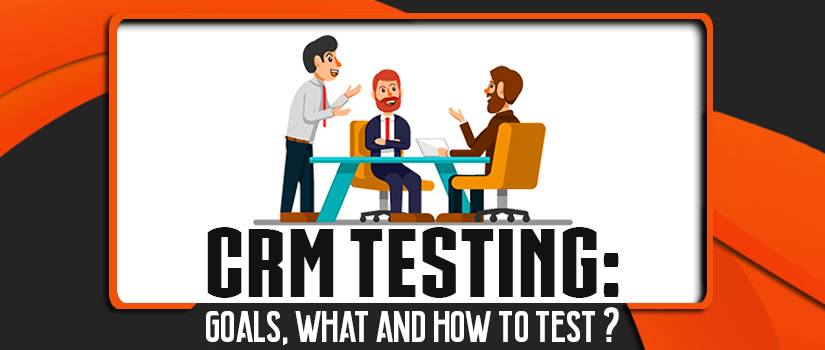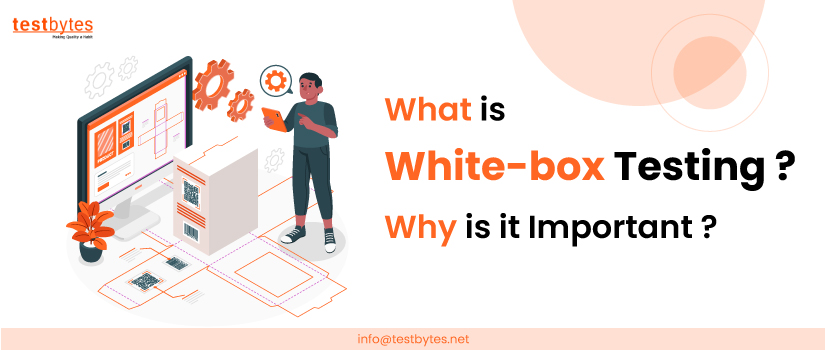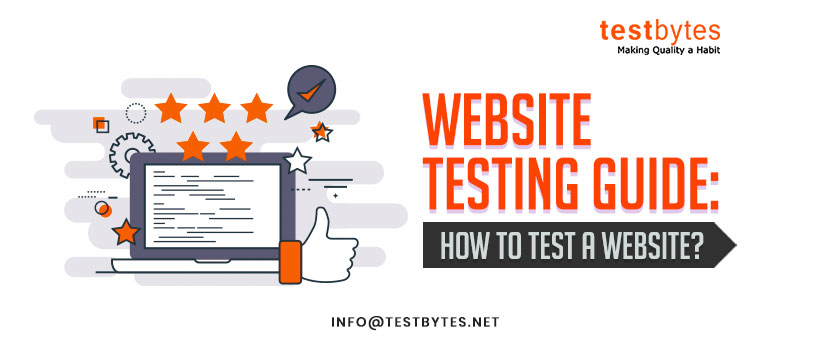
CRM Testing : Goals, What and How to Test?
November 21st, 2018

What is CRM?
CRM (Customer Relationship Management) is a marketing platform based on a database software system.
A database application is utilized for the accumulation and analysis of important customer information for use in executing focused marketing and sales process.

CRM framework is at the center of most companies. A surrey or inappropriately executed component in your CRM platform can directly affect how you comprehend your clients and, thus, do damage to your income.
On the other hand, a sufficiently built CRM can enable you to pick up consumer understanding and magnify consumer prosperity and build trust.
So it is obviously necessary to test the application before and after the deployment to ensure that it is doing what it is supposed to do.
Goals of CRM Testing
It very well can be hard to integrate and manage a CRM system for your unique framework while guaranteeing Omnichannel sales, big data integrity, and support-office segments, which is the reason many of the CRM ventures collapse.
Testing the CRM system lets you enhance client connections by guaranteeing CRM’s documentation, reporting and examining of data works perfectly over all channels, and furthermore encourages you with developments to the different integrating systems and channels.
Testing is the component of CRM testing that decides the accomplishment of your application venture.
It’s critical to comprehend what is being tested in this stage. It’s not the product.
You are trying the client’s capacity to utilize the product. This is a basic refinement that must be comprehended.
The objective in this stage is for the user to confirm to themselves – and to administration – so that they can carry out the activity that is supposedly from them.
At the point when this is accomplished for all users, the release of your new CRM platform and the procedure is fruitful.
The testing ought to incorporate a list of common, genuine scenarios. This ought to be scenarios where a worker needs to utilize the framework to discover data another person has left for them or needs to add information for another person to discover.
Here are a few cases of CRM testing scenarios:
- A rep needs to characterize any circumstances they should think about before a consumer call.
- A salesperson needs to decide their open opportunities.
- An outside salesperson leaves an assignment for an internal salesperson to call a contact after a client visit.
Guidelines to Follow Before Initiating CRM Testing
- Create a testing team
At a fundamental level, you must include:
- Application developer
- Application analyst
- Project manager
- QA test engineer
Also, communication is the single thing which strives for a clear perception of user needs. For developing a quality CRM, the test process isn’t possible without feedback from every team indulged in testing and target users. Keep in mind that CRM test planning, strategy, and implementation rely on the relationship.
- Determine a CRM budget plan
The expense of failing to understand the situation can be high. From paying excessively for application to wasted team time to cover bespoke characteristics you can without much of a doubt can overspend.

If the project manager will not consider the full degree of implementation costs the process can become very costly. So, plan a budget for everything, including:
- Consultancy Fees
- Training
- Phone costs
- Data backup and storage
- Reduced productivity
- Review the payoff
- Handle a risk assessment
3. Set Testing Deadlines
You’ve to be sure that you specify deadlines and ensure that every team member is aware of it. If you don’t specify it, then everybody will delay the task to the last moment and will prolong the testing process than you assigned.
Also, you should be sure you’ve set a plan for what you are testing every week and what you’ll be achieving.
4. Change Management
Incalculable change management standards exist to help battle the resistance, dread of disappointment, and poor communication that affects software executions. The buyer is the focal point of the business.
The testing stage is an extraordinary time to get tips on what individual’s zones are making your workers cope. During the testing process, track these issue zones and build them into training devices for your remaining representatives once the venture has been released.
The testing procedure provides your representatives the opportunity for taking risks and commits errors that they may be hesitant to in the live condition.
By allowing individuals to slip into it, your user compliance and adoption rate will be a lot more prominent, which is an objective of numerous CRM usages.
You can dispatch the most excellent technical platform; however, in case those individuals don’t utilize it, at that point it turns into a disappointment.
What to Test in CRM System?
A testing stage is normal for most of the significant software systems, even with the CRM software utilized by companies. Testing supports to identify mistakes and improve the utilization of the system. CRM testing is basic to the success of CRM activities.

There are essentially two general domains to test in a CRM system, they are – data quality and data conversion, and functionality. Apart from these two main domains, other testing processes also play a crucial role.
Let’s understand them in detail.
Data Quality & Data Conversion
The first test cycle centers around errors identified with data quality and data conversion. At each progression of a customer journey or update, you ought to confirm that the CRM is serving as desired both with and without information. Check the following:
No data duplication: Guarantee that no data is replicated as none is tolerable.
Hidden data remains hidden: Test only the proper data ought to be apparent to different customer roles.
No wrong fields populated: Check details of one exchange ought not to show up under the historical backdrop of another.
New and updated data saves well: Check card and customer data must be saved and updated legitimately.
No missing data: Test the requisite information ought to be accessible to the correct user levels.
Data Is being mapped rightly: Check the chosen fields must show up in the right gridlines.
Graphs depict all data accurately: Test that critical data is exact, like sales rates.
Data sorting done perfectly: Test every sortable field so that it functions as required.
Functionality
The second cycle of testing concentrates on testing the functional features of the CRM platform.
Here are some common functional ranges and related scenarios of a CRM system that ought to be tested:
Access level: User permissions are running as wanted. Especially, non-admin users must not have access to any admin roles.
Connection dropped: For an Enterprise-grade CRM system if the connection between stores drops then cards must not operate and the correct error message surfaces.
Transaction upload: In case that the CRM integrates with a POS, next each of the customer’s purchase data must correctly update at the Point of Sale (POS) in just a couple of seconds.
Inadequate card balance: In case that the shopper does not have adequate balance in his card for completing order payment, so, he ought to be capable to pre-authorize for the value equal to balance accessible on the account and choose other payment option for the outstanding balance of the purchase transaction.
Card data: A customer’s card type or card number ought not to be agitated after the transaction has been made.
Transaction type: Users must be able to switch the transaction class before completing the transaction as well as transactions ought to be settled accurately after the change.
Pre-authorization: If a transaction fails when a card is pre-authorized, the payment bills ought not to print wrongly.
Data mismatch: Consumers with the similar first and last name must not trigger data mismatches and additional issues.
Department particular events: Any restraints on which businesses accept loyalty cards and gift are running as wanted.
Tax: All tax-related situations must work well on pre-authorizing and completing transactions incorporating canceled transactions.
Store-specific deals: Receipts are printing the right store label and address.
Other tests that too need to be performed during CRM testing cycle are:
Performance Testing
During this testing process, the system will work under stress or pressure or load. This can check the consequences of several users on the performance of the system. Some of the features that need to be tested are listed below:
- Peak hours testing
- The highest number of users
- Response time
- Server usage
- Loading speed
- Error with some integrated applications
Regression testing
There will also be a need for regression testing in the CRM system as there’s a demand to test post migration and pre-migration.
Post-migration is checked that if the values are populated into the right fields and validations are met with the data. Other areas must not be disrupted due to this.

This will check the functional accuracy and completeness of the CRM system. By doing the regression testing, the performance and authenticity of the system can be assured. Features that must be tested during this process are:
- Functional completeness and accuracy
- Confidentiality
- Reliability
- Scalability
Security Testing
CRM system comprises a high volume of private data that ought to be secured.
A right security test strategy supports how greatly the system preserves the data against unapproved external and internal access.
Also Read: Game Testing companies are in plenty. Know why testbytes is the best choice for you


 Software Testing Events
Software Testing Events App Testing
App Testing Web App Testing
Web App Testing Game Testing
Game Testing Automation Testing
Automation Testing Load Testing
Load Testing Security Testing
Security Testing Performance Testing
Performance Testing Hire a Tester
Hire a Tester





